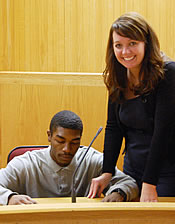When René Gornall ’06 walks into a courtroom, there is no bailiff, opposing attorney, or court reporter in sight, but something more intimidating – teenagers.
 |
|
René Gornall ’06, Time Dollar Youth Court
|
As a contracts manager for
Time Dollar Youth Court in Washington, D.C., Gornall serves as an advocate for disadvantaged youths. The Youth Court’s mission is to provide alternative sentencing to first-time juvenile offenders by serving as a unique pre-petition diversion program. The diversion is in the form of a Youth Court hearing where a juvenile’s case is heard by a jury of his or her peers, who then decide on a sanction for the youth. These sanctions may include jury duty, youth development classes, essay writing, apologies, or community service. The Youth Court operates on the premise that by committing a crime, the youth has “taken” from the community. In order to right the wrong, the youths must give back to the community, specifically by giving their time to act as jurors themselves on the Youth Court.
“The youths we see on a daily basis go to schools where police officers roam the halls constantly and youths are arrested and taken off in handcuffs when they get into a schoolyard fight,” said Gornall. “Other nonprofit after-school programs and recreation centers are closing due to the economy and these youths are left without public places to gather.
They are arrested for disorderly conduct when they hang outside local movie theaters and fast food restaurants. But these are youths that just need a guiding hand to get them back on track.”
The Youth Court works closely with the D.C. Metropolitan Police Department and is authorized by the D.C. Superior Court to act as a diversion program; therefore, youths diverted to the Youth Court are not formally processed into the juvenile justice system and do not carry the stigma that an arrest or conviction can bring. Many youths who go through the Youth Court go on to successfully graduate high school, enroll in college, or seek full-time employment.
“When teens are diverted to the Youth Court after an arrest, it is a second chance for them,” said Gornall. “With our help, they can turn their lives around and become productive citizens who give back to their community, avoiding the ‘school to prison pipeline,’ which refers to the policies in place now in schools and communities that prioritize incarceration over education.
“Who better to judge these youths than their peers, others who live in the same neighborhoods, go to the same schools, and have themselves made similar mistakes? Teenagers often don’t listen to their parents, teachers, and other sources of authority. But they do listen to other teenagers. Teenagers desire acceptance from their peers and youth courts nationally are using the power of positive peer pressure to reduce negative behavior and recidivism.”
Gornall’s primary responsibilities include establishing and maintaining relationships and contracts between funders and the Youth Court, along with researching, grant writing, and program reporting for all new and renewal funding. She also assists with social marketing, media relations, and community partnerships for the Youth Court.
Although Gornall does not practice law in a traditional manner, she uses her law degree in some capacity every day. Instead of acting as an advocate before a judge, she acts as an advocate for youths before the community, funders, and police department. She testifies before the D.C. City Council instead of an appellate court, writes grants and reports instead of petitions or briefs, and mediates fights between teens rather than between warring spouses.
“I didn’t know exactly where my law degree would take me, but like many students I wanted to change the world for the better and to be a part of a professional community that is respected,” said Gornall. “The Dickinson School of Law gave me the tools and, equally important, the confidence to walk into a courtroom full of teenagers and help them make their lives better.”
The fight to keep TDYC alive
Gornall’s proudest accomplishment came in 2009, when the District of Columbia faced its first year of major deficits due to the recession and many social services and nonprofit organizations faced severe budget reductions. The Youth Court’s annual budget was on the chopping block and confronted complete closure.
“Instead of accepting defeat, I rallied youths, parents, volunteers, the local community, and many others to come together and fight for the Youth Court,” said Gornall. “We organized mass mailings and phone campaigns, contacted council members and government officials, held public meetings, and alerted the media. In the end, we received a last minute reprieve and were able to keep our doors open and are still here two years later, despite continued economic downturns in the nonprofit community. The look on our youths’ faces when we gave them the news that we would continue operating made all the late hours, frantic weekend meetings, and last ditch efforts worth it.”
In her spare time, Gornall serves as a volunteer for SCAN (Stop Child Abuse Now) of Northern Virginia in their CASA (Court Appointed Special Advocates) program. In this role, she advocates for children in the juvenile court system due to abuse or neglect. She also volunteers as a primate interpreter at the Smithsonian’s National Zoological Park. She resides in Arlington, Virginia, and enjoys spending time with her boyfriend, John Riley ’06.